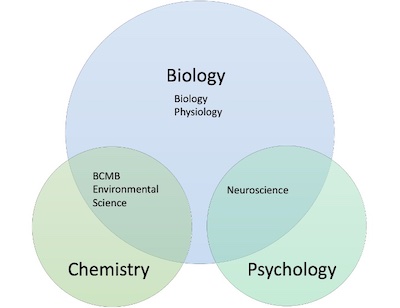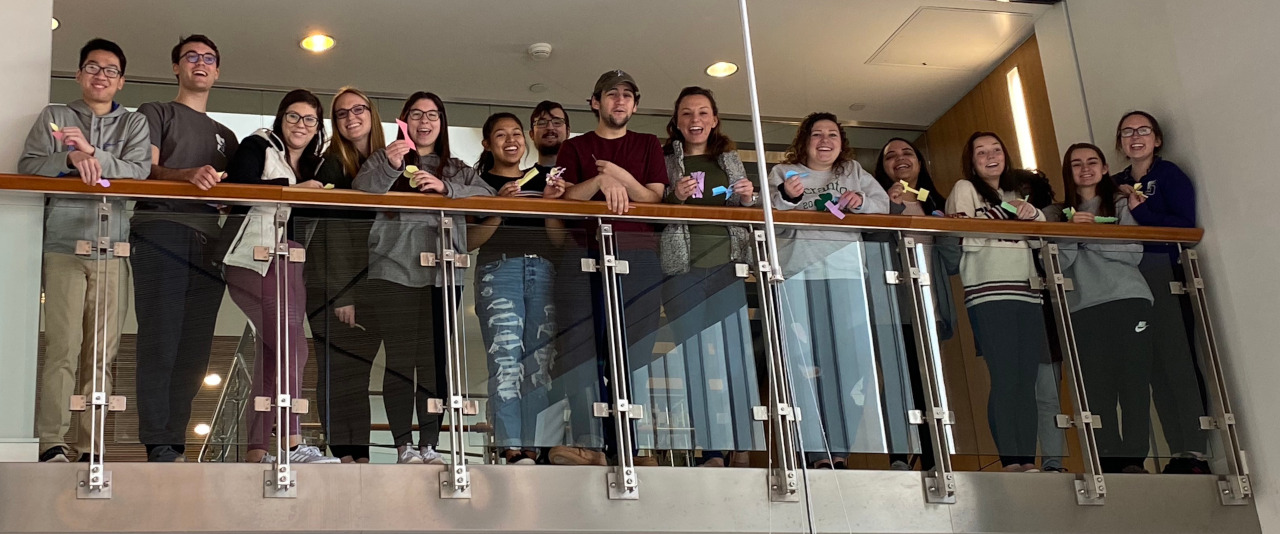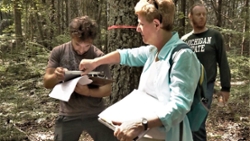Biology Department
What We Do:
We are passionate about biology! Our talented faculty are actively engaged in their teaching and research and encourage students to become active learners and researchers. From molecules and cells to whole organisms to the interactions of organisms with the environment, our courses and programs permit students to explore the diversity of life on earth and the principles that help us comprehend it.
Our goal is to present the fundamental scientific facts, concepts, and techniques needed to understand the living world and to help students develop the skills they need to apply this knowledge to contemporary global issues.
How We Stand Out:
- Students work closely with their advisors -- who are biology faculty members -- to develop a program of courses and activities best suited to each student’s academic and career goals.
- We have a dynamic group of enthusiastic faculty with specializations across a broad range of biological sciences. Our faculty are here because they are dedicated to teaching undergraduates and including undergraduates in their research.
- Students have the opportunity to take courses with outstanding scholars in their fields and work side-by-side with them in their research.
- Our small class sizes foster close collaboration between students and faculty. Upper level labs are limited to 16 students and are taught by full time faculty.
- The award-winning Loyola Science Center was designed to showcase science as a human endeavor. Laboratory and study spaces provide opportunities for collaborative work.
- Faculty put students first as part of our Jesuit mission of "cura personalis".
Programs:
We offer a suite of majors in the biological sciences that range from those that focus on molecules and cells to those that focus on the interactions of organisms with their environments.

Programs Housed Within the Department:
- Biology - The biology major is the largest major on our campus and provides students with a strong background across the broad field of biology. It is an extremely versatile degree that provides an excellent foundation for careers in science and healthcare. Students in the major study the diversity of life on earth, focusing on fundamental concepts such as the relationship between structure and function, evolution, and integration across the discipline. Through one-on-one interaction with our faculty, our students gain in-depth experience in the process of science, learn laboratory techniques, and share in the excitement of scientific discovery.
- Physiology - Students of physiology learn how organisms function at many levels of organization, from the molecular and cellular level up to the organismal and ecological levels. Our Physiology major maintains a focus on an integrated approach both in lecture and laboratory to facilitate student learning, enabling us to best prepare the next generation of biomedical providers and physiology researchers.
Interdisciplinary Programs:
- Biochemistry, Cell and Molecular Biology - The BCMB major is an interdisciplinary program of study between the biology and chemistry departments. The program provides students with an understanding of the fundamentals of biology and chemistry and the key principles of biochemistry, cell and molecular biology, as suggested by the American Society of Biochemistry and Molecular Biology. There is a strong emphasis on genomics, proteomics and bioinformatics. Students who graduate from the program are expected to possess skills suitable for biotechnical work in the pharmaceutical, health and agricultural industries and for further academic pursuits in graduate or professional schools.
- Environmental Science - The environmental science major is an interdisciplinary program of the biology and chemistry departments. The program provides students with a comprehensive understanding of the interactions between biological, chemical, and physical aspects of the natural environment. The curriculum includes rigorous training in analytical and instrumental techniques commonly used to investigate environmental problems. Majors have the flexibility to concentrate their studies on either biological or chemical aspects depending on interests and desired career path. Experiential learning opportunities, such as an internship or an undergraduate research project, are also required. Exposure to social, political, regulatory, economic, and ethical concerns surrounding environmental issues and policy is integrated into the coursework as well.
- Neuroscience - With one of the oldest undergraduate neuroscience programs in the country (founded in 1987), 13 faculty and 110 students, Scranton provides a close knit community for learning and developing ideas that lead to an expanding number of careers in clinical settings, research, teaching, criminal justice, and other areas. Students who choose this remarkably flexible science major can choose courses that best fit their career paths while here, even if their initial specific goal changes as their college experience expands. The program is small enough to provide the small university benefits of personal connection and exposure, but large enough to provide large university opportunities to work toward career attainment in an expanding, enduring, socially relevant, and rewarding field.
Meet Our Faculty:
Our faculty are strongly committed to excellence in teaching and research. They also are committed to making students active participants in the processes of learning and research. Because of this philosophy and our small class sizes, our faculty become well acquainted with our students, and we encourage interested students to become involved in faculty research.
For many faculty members, their passion for biology stems from a personal experience that has shaped their scholarship. For example, Dr. Janice Voltzow grew up on the Florida Gulf Coast where she collected seashells during her childhood. Today, her research involves marine snails.
Inside the Classroom:
- Rigorous academics
- Project-based learning
- Faculty-mentored research opportunities
Our small class sizes allow students close personal interaction with our faculty, allowing close collaboration in the learning environments and instruction directed towards the individual student.
Many of our laboratory courses integrate independent research and inquiry, allowing students to be active participants in the learning process.
Student Research:
We firmly believe that research is a critical and integral part of the educational process. The faculty of the Biology Department is deeply committed to involving students in their research endeavors.
Students work hand-in-hand with faculty collaborators. Students are also encouraged to attend and participate in local and national scientific meetings and conferences, allowing them to hone their scientific communication skills as well as network with other students and scientists from around the globe.
Career Outcomes:
We prepare our students for a broad range of professions in these fields and for entrance into professional schools for health professions.
Where Do Our Students Go When They Graduate?
- Medical schools
- Dental schools
- Physician assistant programs
- Graduate programs in biological sciences
- Government agencies
- Fulbright fellowships abroad
- Pharmaceutical industry
- Environmental consulting firms
- Clinical diagnostic laboratories
- National government laboratories
- Biotechnology companies
- Research universities
- Medical research companies
- Community volunteer organizations
Our majors provide a comprehensive education across the field of biology that will prepare students for a career in any path of their choosing.
Dr. Spencer Galen, Assistant Professor









